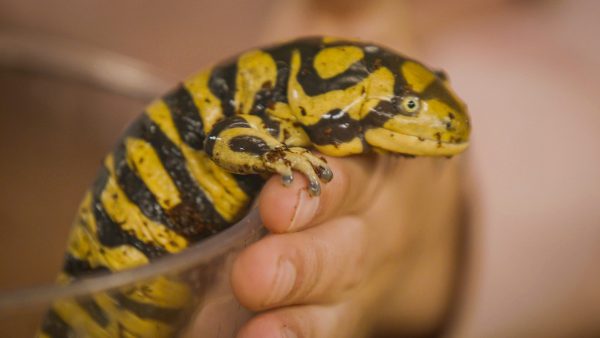Scientific Name Definition
A scientific name consists of an organism's genus and species. For example, humans are *Homo sapiens*.
View Lesson on Classification of Living Things
Become a member to get full access to our entire library of learning videos, reading material, quiz games, simple DIY activities & more.
Become a member to get full access to our entire library of learning videos, quiz games, & more.
Plans & Pricingto watch this full video.

Access All Videos
and Lessons, No Limits.
Access All Videos

No credit card required,
takes 7 sec to signup.
No card required

Ready-to-go lessons
that save you time.
Ready-to-go lessons
If you are on a school computer or network, ask your tech person to whitelist these URLs:
*.wistia.com, fast.wistia.com, fast.wistia.net, embedwistia-a.akamaihd.net
Sometimes a simple refresh solves this issue. If you need further help, contact us.
Classification of Living Things
Fun Facts
- Scientific names use Lati, which was considered the language of science when the system was set up hundreds of years ago.
- We need scientific names because every language has a different name for the same organism.
- Dogs are scientifically named Canis familiaris.
Why Do We Need To Know About Scientific Name
Learning scientific names helps us speak the same biology language everywhere in the world. It makes sure everyone knows exactly which creature or plant we’re talking about, no matter where they are. This is important for sharing research, saving animals and plants, and figuring out diseases in medicine.
This way of naming things isn’t just for school; it’s used by doctors to find out what’s making someone sick, and by scientists working to protect animals and plants. It helps us understand and study all the different forms of life, from tiny bugs to the big, mysterious ocean.
Frequently Asked Questions
Check out the Full Lesson on Classification of Living Things
In this lesson, we learn that:
- Scientists classify living things based on shared traits.
- Classification helps us understand how living things are related.
- There are 8 levels of organization that scientists use to sort all living things.
Related Topics
- Air Mass Definition
- Analog Signal Definition
- Bioindicator Definition
- Biosphere Definition
- Body Fossils Definition
- Cellular Respiration Definition
- Chemistry Definition
- Chloroplast Definition
- Circuit Definition
- Classify Definition
- Computer Programming Definition
- Conservation Definition
- Definition Of Extreme Weather
- Dichotomous Key Definition
- Earth’s Orbit Definition
- Engineer Definition
- Erosion Definition
- Food Chain Definition
- Fresh Water Definition
- Gas Definition
- Humidity Definition
- Inherited Traits Definition
- Life Cycle Definition
- Light Reflection Definition
- Lunar Mare Definition
- Mass Definition
- Moon Definition
- Motion Definition
- Muscular System Definition
- Organelle Definition
- Particle Model Of Matter Definition
- Pendulum Definition
- Pollinator Definition
- Properties Of Matter Definition
- Reproduction Definition
- Scientific Name Definition
- Seed Dispersal Definition
- Seeing Definition
- Solar System Definition
- Species Definition
- Taxonomy Definition
- Temperature Definition
- Texture Definition
- Thermal Energy Definition
- Tides Definition
- Transform Boundary Definition
- Transverse Wave Definition
- Wedge Definition
Start a Free Trial Today. Get a $5 Amazon Gift Card!
Teachers! Start a free trial & we'll send your gift card within 1 day. Only cards left. Try it now.
Select Grade
Select Subject
This email is associated with a Science Kit subscription. Kit subscriptions are managed on this separate page: Manage Subscription

-
Download InvoiceScience & Math$/yr
-
Download InvoiceScience Only$/yr

access all lessons
• No credit card required •
"My students loved the videos. I started the video subscription in May and used them as a review before the state test, which I know contributed to 100% of my class passing the state test."
Rhonda Fox 4th Grade Teacher, Ocala, Florida
• No credit card required •
"My students loved the videos. I started the video subscription in May and used them as a review before the state test, which I know contributed to 100% of my class passing the state test."
Rhonda Fox 4th Grade Teacher, Ocala, Florida
• No credit card required •
Already a member? Sign In
* no credit card required *

* no credit card required *
* no credit card required *


no credit card required
Skip, I will use a 3 day free trial
Enjoy your free 30 days trial
-
Unlimited access to our full library
of videos & lessons for grades K-5. -
You won’t be billed unless you keep your
account open past your 14-day free trial. -
You can cancel anytime in 1 click on the
manage account page or by emailing us.
-
Unlimited access to our full library of videos & lessons for grades K-5.
-
You won't be billed unless you keep your account open past 14 days.
-
You can cancel anytime in 1-click on the manage account page.
Cancel anytime in 1-click on the manage account page before the trial ends and you won't be charged.
Otherwise you will pay just $10 CAD/month for the service as long as your account is open.
Cancel anytime on the manage account page in 1-click and you won't be charged.
Otherwise you will pay $10 CAD/month for the service as long as your account is open.
We just sent you a confirmation email. Enjoy!
DoneWe use cookies to make your experience with this site better. By using this site you agree to our use of cookies. Click "Decline" to delete and block any non-essential cookies for this site on this specific property, device, and browser. Please read our privacy policy for more information on the cookies we use.Learn More
We use cookies to improve your experience. By using this site, you agree to our use of cookies. Click "Decline" to block non-essential cookies. See our privacy policy for details.Learn More



























































































































